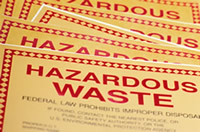
Among the violations were failure to adequately train personnel, failure to properly label and seal containers, failure to control tank emissions, failure to monitor equipment, failure to provide an adequate contingency plan, and failure to provide a leak detection system.
These RCRA violations cost this company more than $62,000.
Training Very Important to RCRA Compliance
Training is a big part of RCRA compliance and at least part of that fine was for failing to properly train workers who handle hazardous wastes.
RCRA requires that all workers who handle or come in contact with hazardous waste receive training. Employers must have a written training program outlining the training that will be given. The document must also clarify which personnel or job functions require training.
EPA’s hazardous waste training rules specifically apply to:
- LQGs, which are generators of more than 1 kg (2.2 lb) of acutely hazardous waste or 1,000 kg (2,200 lb) or more of hazardous waste per month, and,
- Owners and operators of treatment, storage, and disposal facilities
According to federal regulations, small quantity generators are not required to have a formal written training program for their employees. However, they are required to ensure that facility personnel are thoroughly familiar with proper waste handling procedures and emergency response procedures relevant to their responsibilities during normal facility operations and emergencies.
Despairing ever getting your employees trained? It isn’t easy to fit it in—schedule-wise or budget-wise—but now there’s the Environmental Compliance Library from Employee Training Center. Train all your people, at their convenience, 24/7. Start Your Free Trial
Who’s Off-the-Hook for RCRA Training?
With regards to training, EPA defines "personnel" in the regs to mean anyone who has something to do with complying with the hazardous waste regulations. A no-brainer example of this is a person who prepares a hazardous waste manifest. But what about other types of workers, like administrative workers who may be less involved with your waste management activities?
Many environmental experts say that the workers who need to be trained are anyone who is regularly exposed to an area where hazardous waste is generated, treated, stored, or shipped. It really depends on what the definition of "regularly" is. It can include a machinist, a shop foreman (who goes to the floor 5 to 6 times a day, the plant manager (who come to the floor 3 to 4 times a week), and the payroll clerk who drops off the checks on the foreman’s desk each week.
When reviewing training records EPA is determining whether employees are receiving a level of training that is commensurate with their duties as well as their ability to respond to any emergency situation at the facility. Some good advice–when in doubt, train.
Train on demand with Employee Training Center. Register today to start your FREE trial and get instant access to over 20 environmental compliance courses. Start Your Free Trial
What Your RCRA Training Program Should Have
Your hazardous waste facility operation and maintenance training program should contain, at a minimum, the following elements:
- Process operation and controls
- Waste acceptance procedures
- Equipment maintenance requirements
- Required PPE
- Emergency procedures
- Emergency equipment
- Emergency plan
- Contingency plan
- Emergency coordination
- Arrangements with local authorities
- How to report an emergency
- Emergency response to fires, explosions, and spills
See tomorrow’s Advisor for a comprehensive checklist for RCRA’s hazardous waste personnel training requirements.
